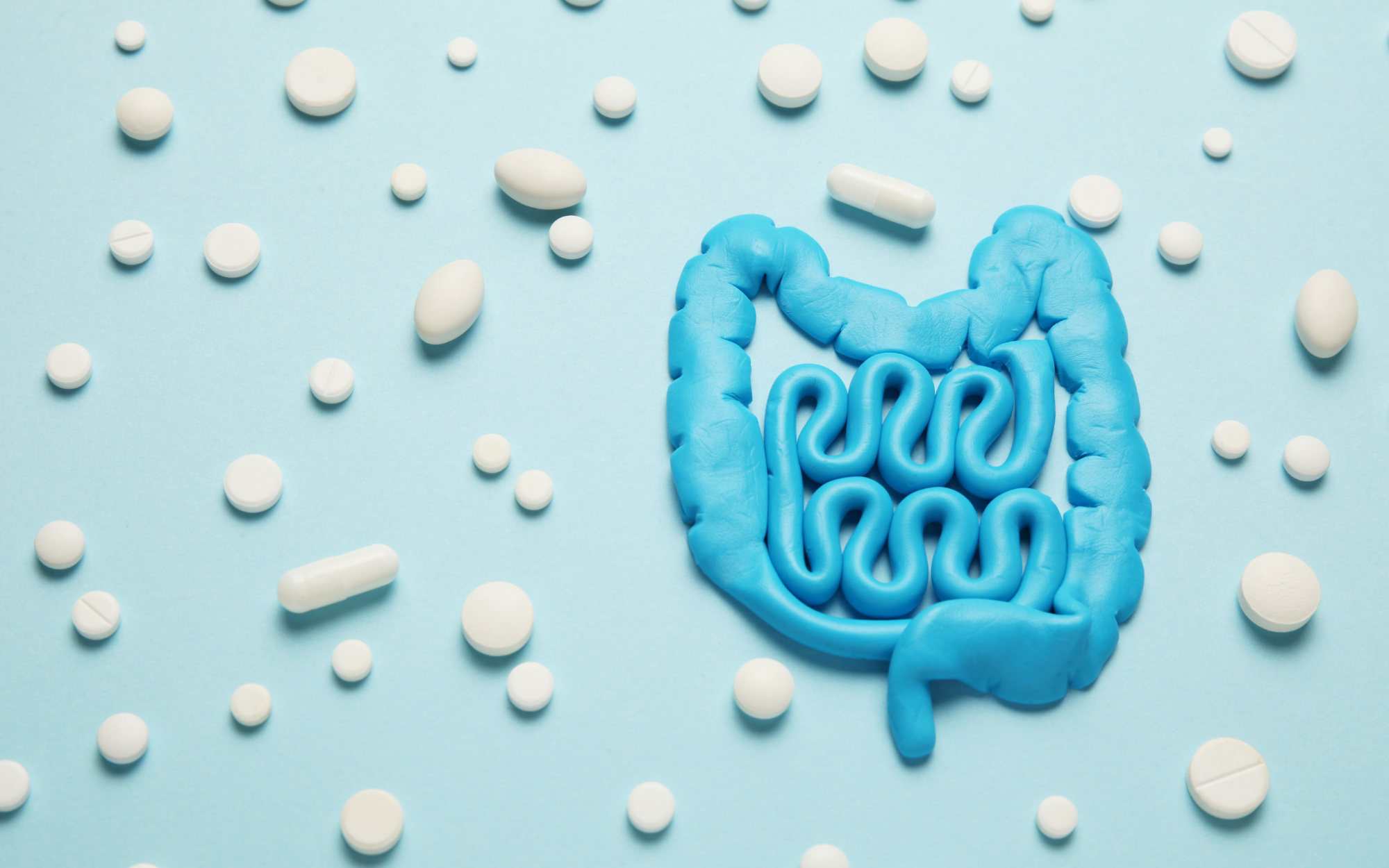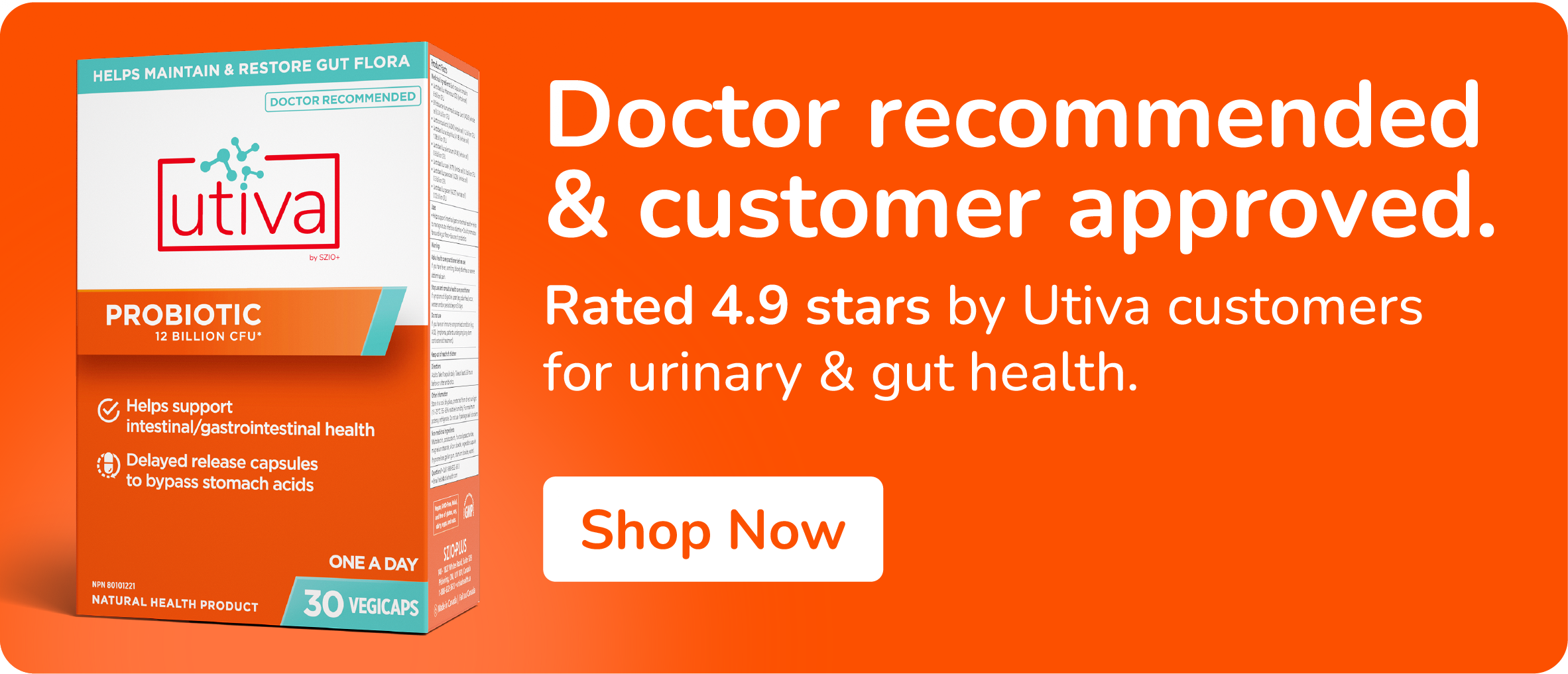Probiotics 101: How to boost gut health and manage your UTIs

Reviewed by Board Certified Urologist Dr. Yana Barbalat
Antibiotics have been the go-to infection fighter for a long time. From strep throat to urinary tract infections, chances are you’ve probably been prescribed antibiotics at least once.
But what’s the deal with probiotics? Can they do the same job as antibiotics? More importantly, can they do it better?
Here are the facts. Probiotics are an effective and natural way to improve your gut health and manage infections. They can keep your microbiome in balance and repair the damage that antibiotics do to your body, especially for those suffering from chronic UTIs.
Around the world, 60% of all women will experience at least one UTI in their lifetime. And after the first infection, they have a 24% chance of getting another one. These recurrent UTIs typically require round after round of antibiotics, making your body antibiotic-resistant and killing off good bacteria with the bad.
Enter: probiotics. Let’s break down all the benefits of introducing more probiotics to your body, from keeping your gut in check to preventing and treating UTIs.
But first, what are probiotics?
In your body right now, you’re holding over 100 trillion microbes. These are active, living bacteria cells (and they outnumber your DNA cells about 100 to 1). Bad microbes cause infections and viruses. Good microbes heal the body and fight off the bad microbes.
Probiotics are one of the good guys. They can support your immune system, help with digestion, destroy cells that cause disease, prevent skin issues, produce natural vitamins, and even heal leaky gut.
How do probiotics improve gut health?
Fun fact: most of your immune system actually exists in your gut and so does the majority of the bacteria living in your body. The immune system and that “good” bacteria are in a co-dependent relationship that keeps your body balanced. That’s why introducing good bacteria to your gut can keep your immune system strong and stable. In fact, poor gut health has been linked to several chronic illnesses, including cancer, diabetes, and heart disease.
When you give your gut a healthy dose of probiotics, it levels the playing field between good and bad bacteria. In other words, it’s less likely for bad bacteria to take over and wreak havoc on your body.
Can I take probiotics for UTI prevention?
We know that probiotics are a dream for gut health. But how do probiotics help reduce UTIs? Simple: by balancing your bacteria.
Your genitals and urinary tract are packed with all sorts of microbes, good and bad. You need a healthy balance of those microbes to keep your genital health in check and protect your urinary tract from infection.
Some of the good microbes are thought to produce protective chemicals and environment to keep the bad bacteria out. If they decrease in number, which often happens after antibiotic use, or as women age, there is an opportunity for the bad bacteria to settle in and invade. Scientific studies have also shown that good bacteria interacts with our immune system and helps it function better.
If you suffer from chronic UTIs, the constant antibiotics cycle has probably wiped out a lot of your good microbes. By taking probiotics for UTIs, 90% of people can restore the balance that antibiotics destroy and prevent recurrent UTIs long-term.
Can I take probiotics to treat a UTI?
UTI treatment typically starts with an antibiotic, but a probiotic is a great option to help support the process and recovery after the antibiotic.
If your doctor prescribed antibiotics for your UTI, pair them with a high-quality probiotic supplement. Antibiotics are experts at killing infections, but they aren’t so great at leaving the good bacteria alone. Upping your probiotic intake at the same time will help maintain a healthy bacteria balance and provide another layer of treatment support.
Take your probiotic and antibiotic every day, a few hours apart. Once your antibiotics are done, keep up with the probiotics to replace any good bacteria you lost.
Want a more natural UTI prevention approach? Try pairing your probiotics with d-mannose and PACs supplements, like in Utiva’s MAX Power Bundle.
D-mannose is a type of sugar that is clinically proven to stick to E. coli and get it out of your system. Since the majority of UTIs are caused by E. coli sneaking into the urinary tract, taking daily d-mannose supplements with your probiotics can potentially prevent and treat most UTIs.
Proanthocyanidins, also known as PACs, are all-natural compounds derived from cranberries that are clinically proven to stop bacteria from sticking to the urinary tract lining. With a combination of probiotics, d-mannose, and a Cranberry PACs supplement with at least 36 mg of PACs per dose, you’ll be fully prepared to naturally ward off UTIs.
Before using these methods as your only course of prevention, talk to a doctor about your options.
How can I get more probiotics?
On top of supplements, dietary changes can make a big impact on your probiotic levels.
Add more fermented foods to your diet, like sauerkraut, kombucha, kimchi, and yogurt. Fermented food goes through a process called lacto-fermentation, which creates probiotics in a natural, healthy way.
Try these other diet hacks to improve your gut health and create an environment where good bacteria can thrive:
- Avoid sugars, refined carbs, and processed foods
- Make sure at least 75% of your plate has produce and plant-based foods
- Switch to healthier oils, like coconut or avocado
- Consume more healthy fats, like omega 3
- Eat lots of fibre-rich foods, like nuts and seeds
- Limit the amount of animal protein you eat
What is the best probiotic for urinary tract infection?
A high-quality probiotic supplement is key to preventing and treating UTIs. When choosing a brand, make sure it has at least 10 billion CFUs. A CFU is a unit of living bacteria in each dose.
Search for a probiotic that is plant-based and can resist stomach acids, like Utiva Probiotic. Each capsule is made with proprietary technology, delayed release (DR), that is specially designed to absorb past the gut. Without a DR capsule coating, a pill could dissolve completely into the stomach, which decreases nutritional absorption and has a negative impact on the probiotic strains.

Speaking of strains, make sure your probiotic has a good blend of them. A mixture of various Lactobacillus strains and Bifidobacterium has been shown to reduce the side effects of antibiotics, helping restore the gut and vaginal microbiome (i.e. healthy bacteria). Utiva Probiotic includes these strains in a vegan, acid-resistant DR Capsule. Our probiotic is also shelf-stable, gluten-free, dairy-free, and made in Canada.
But don’t simply look for the name of the strain. Check to see how many of each strain are included in each dose. Aim for a substantial amount of the right strains to optimize your gut and urinary tract health.
And don’t forget: probiotics contain living, active cultures. To keep them that way, keep them refrigerated!
Take probiotics for UTI and gut health
For the best UTI prevention, try Utiva’s Max Power Bundle. This bundle is a UTI prevention powerhouse that includes all three of our most effective supplements: Utiva Probiotic Power, D-Mannose, and Cranberry PACs.
Our plant-based Utiva Cranberry PACs supplement is packed with 36 mg of PACs in every dose, putting a barrier between bad bacteria and your urinary tract lining.
To stay in the know about UTI management, prevention, and how urinary tract probiotics can keep recurrent UTIs at bay, go to www.utivahealth.ca.Knowledge is power
Sign up to our newsletter to keep learning!

- Choosing a selection results in a full page refresh.
- Opens in a new window.


